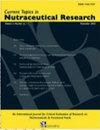Protection of Neuronal Cells from Lipopolysaccharide-Induced Systemic Inflammation by Gossypetin
IF 0.4
4区 医学
Q4 NUTRITION & DIETETICS
Current Topics in Nutraceutical Research
Pub Date : 2023-04-07
DOI:10.37290/ctnr2641-452x.21:138-143
引用次数: 0
Abstract
Systemic inflammation caused by infection, surgery, or injury can lead to cognitive decline. Lipopolysaccharides are known as toll-like receptor 4 ligands, which are common to the cell walls of gram-negative bacteria. Activation of toll-like receptor 4 leads to the production of proinflammatory cytokines that subsequently mediate systemic inflammation. Furthermore, induc¬tion of systemic inflammation by lipopolysaccharide injection in mice can affect the brain, including cognitive functions. To investigate the neuroprotective role of gossypetin in systemic inflammation, a mouse hippocampal cell line (HT22) and mice were challenged with lipopolysaccharide. The increase in proinflammatory cytokines and reactive oxygen species caused by lipopolysaccharide treatment in HT22 cells was decreased by gossypetin treatment. To evaluate the protective function against memory impairment, gossypetin was orally administered to C57BL/6J mice receiving lipopolysaccharide injec¬tion. Lipopolysaccharide-induced memory deficit was observed in lipopolysaccharide-only treated group in Y-maze test. However, the group treated with gossypetin and lipopolysaccharide had a diminution in cognitive impairment. Consistent with the behavioral test results, the proinflammatory cytokines were also relatively downregulated in the gossypetin-treated mouse group. To sum up, gossypetin can be protect the neuron cells from inflammation in vitro and prevent the cognitive impairment in mice in vivo.棉酚素对神经元细胞的保护作用
由感染、手术或损伤引起的全身炎症可导致认知能力下降。脂多糖被称为toll样受体4配体,常见于革兰氏阴性菌的细胞壁。toll样受体4的激活导致促炎细胞因子的产生,随后介导全身炎症。此外,脂多糖注射诱导小鼠全身炎症会影响大脑,包括认知功能。为了研究棉子素在全身炎症中的神经保护作用,用脂多糖攻击小鼠海马细胞系(HT22)和小鼠。棉子素处理减少了脂多糖处理引起的HT22细胞中促炎细胞因子和活性氧的增加。为了评估对记忆损伤的保护作用,对接受脂多糖注射的C57BL/6J小鼠口服棉子素。在Y迷宫试验中,仅脂多糖处理组观察到脂多糖诱导的记忆缺陷。然而,棉子素和脂多糖治疗组的认知障碍有所减轻。与行为测试结果一致,在棉子素治疗的小鼠组中,促炎细胞因子也相对下调。综上所述,棉子素在体外具有保护神经元细胞免受炎症的作用,在体内具有预防小鼠认知功能障碍的作用。
本文章由计算机程序翻译,如有差异,请以英文原文为准。
求助全文
约1分钟内获得全文
求助全文
来源期刊
CiteScore
1.10
自引率
0.00%
发文量
36
审稿时长
>12 weeks
期刊介绍:
Current Topics in Nutraceutical Research is an international, interdisciplinary broad-based peer reviewed scientific journal for critical evaluation of research on chemistry, biology and therapeutic applications of nutraceuticals and functional foods. The major goal of this journal is to provide peer reviewed unbiased scientific data to the decision makers in the nutraceutical and food industry to help make informed choices about development of new products.
To this end, the journal will publish two types of review articles. First, a review of preclinical research data coming largely from animal, cell culture and other experimental models. Such data will provide basis for future product development and/or human research initiatives. Second, a critical evaluation of current human experimental data to help market and deliver the product for medically proven use. This journal will also serve as a forum for nutritionists, internists, neurologists, psychiatrists, and all those interested in preventive medicine.
The common denominator of all of the topic to be covered by the journal must include nutraceuticals and/functional food. The following is an example of some specific areas that may be of interest to the journal. i) Role of vitamins, minerals, antioxidants and phytonutrients on cardiovascular health, cancer, diabetes, ocular health, mental health, men’s health, women’s health, infant nutrition, ii) Role of herbals on human health, iii) Dietary supplements and sleep, iv) Components of diet that may have beneficial effect on human health, v) regulation of apoptosis and cell viability, vi) Isolation and characterization of bioactive components from functional foods, vii) Nutritional genomics, and viii) Nutritional proteomics.

 求助内容:
求助内容: 应助结果提醒方式:
应助结果提醒方式:


